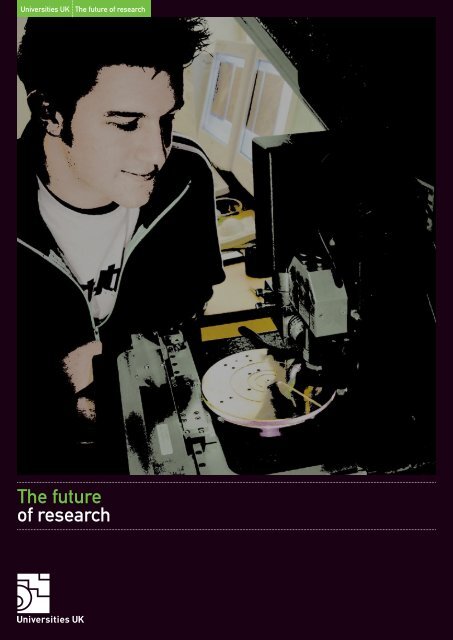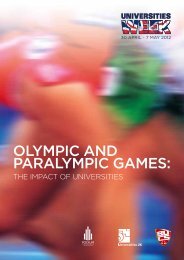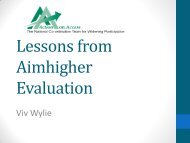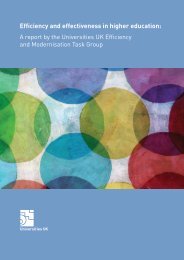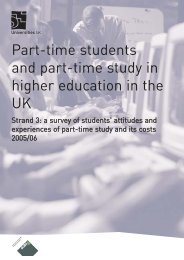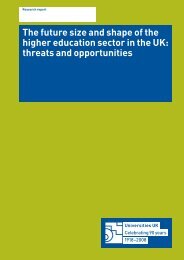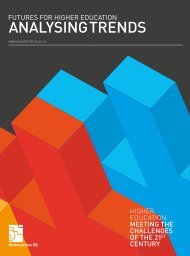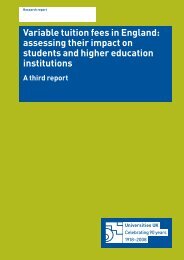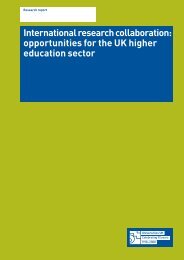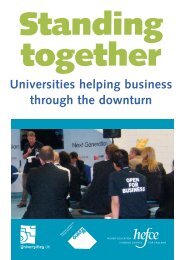The future of research - Universities UK
The future of research - Universities UK
The future of research - Universities UK
Create successful ePaper yourself
Turn your PDF publications into a flip-book with our unique Google optimized e-Paper software.
<strong>Universities</strong> <strong>UK</strong> <strong>The</strong> <strong>future</strong> <strong>of</strong> <strong>research</strong><br />
I-2010-058(a)<br />
<strong>The</strong> <strong>future</strong><br />
<strong>of</strong> <strong>research</strong>
Contents<br />
Foreword 1<br />
<strong>The</strong> <strong>future</strong> <strong>of</strong> <strong>research</strong> 3<br />
Facing up to the <strong>future</strong> 5<br />
Do we need universities to<br />
undertake <strong>research</strong>? 7<br />
Stakeholders within the <strong>UK</strong> 9<br />
- Recommendations<br />
Global partnerships 11<br />
- Recommendations<br />
Research quantity and quality 13<br />
- Recommendations<br />
<strong>The</strong> competency <strong>of</strong> the 16<br />
workforce<br />
- Recommendations<br />
Summary <strong>of</strong> recommendations 18<br />
This series <strong>of</strong> Research reports published by <strong>Universities</strong> <strong>UK</strong> (U<strong>UK</strong>) will present the results<br />
<strong>of</strong> <strong>research</strong> we have commissioned or undertaken in support <strong>of</strong> our policy development<br />
function. <strong>The</strong> series aims to disseminate project results in an accessible form and there<br />
will normally be a discussion <strong>of</strong> policy options arising from the work.<br />
<strong>The</strong> copyright for this publication is held by <strong>Universities</strong> <strong>UK</strong>. <strong>The</strong> material may be copied<br />
or reproduced provided that the source is acknowledged and the material, wholly or in<br />
part, is not used for commercial gain. Use <strong>of</strong> the material for commercial gain requires<br />
the prior written permission <strong>of</strong> <strong>Universities</strong> <strong>UK</strong>.
<strong>Universities</strong> <strong>UK</strong> – <strong>The</strong> <strong>future</strong> <strong>of</strong> <strong>research</strong><br />
1<br />
Foreword<br />
t<br />
1. Researcher from the<br />
University <strong>of</strong> Swansea’s<br />
internationally recognised<br />
multidisciplinary team<br />
within the school <strong>of</strong><br />
engineering (shown here<br />
and front cover).<br />
<strong>The</strong> timing <strong>of</strong> this report is critical. <strong>The</strong> <strong>UK</strong>’s coalition government is facing the<br />
toughest spending decisions in recent history and the 10 year science and<br />
innovation investment framework is approaching its final stages. As the new<br />
Minister for <strong>Universities</strong> and Science has rightly acknowledged, the success <strong>of</strong> the<br />
<strong>UK</strong>’s science and <strong>research</strong> base is absolutely critical to ensuring the <strong>UK</strong>’s <strong>future</strong><br />
economic growth and prosperity. As such, continued political commitment and<br />
investment – even in times <strong>of</strong> relative austerity – is vital.<br />
This report considers how the <strong>UK</strong>’s <strong>research</strong> community – the<br />
funders, enablers and supporters <strong>of</strong> <strong>research</strong> – can work together to build on,<br />
maintain and enhance the world-leading science and <strong>research</strong> in our universities.<br />
We hope that this report will help inform the government’s spending and policy<br />
decisions which will impact significantly on the ability <strong>of</strong> the <strong>UK</strong>’s universities to<br />
deliver the world-leading <strong>research</strong> which supports and drives the <strong>UK</strong> economy.<br />
<strong>The</strong> strength <strong>of</strong> the <strong>UK</strong> university <strong>research</strong> base is well<br />
documented and widely accepted. <strong>The</strong> <strong>UK</strong> continues to punch well above its<br />
weight and our <strong>research</strong> remains the most productive and efficient <strong>of</strong> all the G8<br />
countries. <strong>The</strong> <strong>UK</strong> has 14.4 per cent <strong>of</strong> the most highly cited one per cent <strong>of</strong> papers<br />
(which places us second to the US overall, but ahead in clinical sciences, health<br />
sciences, biological sciences and environmental sciences). And crucially during<br />
the current economic climate, the <strong>UK</strong> <strong>of</strong>fers the best value for money. We now rank<br />
first among the G8 nations on the number <strong>of</strong> citations in relation to public spend<br />
on R&D. <strong>The</strong> most recent Research Assessment Exercise (RAE) also demonstrated<br />
that we continue to produce many university departments <strong>of</strong> international and<br />
world leading status.
<strong>Universities</strong> <strong>UK</strong> – <strong>The</strong> <strong>future</strong> <strong>of</strong> <strong>research</strong><br />
2<br />
However, we cannot take our position for granted. <strong>The</strong> world is changing<br />
rapidly and the environment within which university <strong>research</strong> now operates is<br />
very different from the system that has produced these very striking achievements.<br />
This report, prepared for <strong>Universities</strong> <strong>UK</strong>, by Evidence, a Thomson Reuters business,<br />
suggests that a degree <strong>of</strong> re-balancing and re-focusing – rather than a cataclysmic<br />
change – is required in order for the <strong>UK</strong> to maintain its world leading position<br />
in science and <strong>research</strong>. Equally, we need to build on the mechanisms which<br />
currently work well and have played a key role in driving our success, such as<br />
the dual support system and the flexibility <strong>of</strong> the quality related (QR) block grant,<br />
distributed by the <strong>UK</strong> funding bodies, which must be retained. This dual approach<br />
must inform a strategic approach to policy and investment in science and <strong>research</strong><br />
over the next 10 years.<br />
<strong>The</strong> report makes a number <strong>of</strong> recommendations and we hope<br />
that its key findings will be <strong>of</strong> interest to policy makers across the <strong>UK</strong> as well as<br />
to the university sector and the wider <strong>research</strong> community. We look forward to<br />
working with government, the higher education funding councils and the <strong>research</strong><br />
councils on the development <strong>of</strong> a clear and coherent strategy to take forward<br />
some <strong>of</strong> the issues and challenges presented in the report.<br />
We are grateful to the authors for analysing the issues so<br />
clearly. We would also like to thank <strong>Universities</strong> <strong>UK</strong>’s Advisory Group, chaired<br />
by Pr<strong>of</strong>essor Eric Thomas, Vice-Chancellor, University <strong>of</strong> Bristol, for their very<br />
valuable input throughout this process. Finally, we would like to thank the many<br />
organisations and individuals who attended a round table event on 27 April 2010<br />
to discuss the key emerging issues, the dialogue from which has helped to<br />
inform the report’s final conclusions and recommendations.<br />
Pr<strong>of</strong>essor Steve Smith<br />
President, <strong>Universities</strong> <strong>UK</strong>
3<br />
<strong>Universities</strong> <strong>UK</strong> – <strong>The</strong> <strong>future</strong> <strong>of</strong> <strong>research</strong><br />
<strong>The</strong> <strong>future</strong> <strong>of</strong> <strong>research</strong><br />
This report looks at the <strong>future</strong> opportunities and challenges facing the <strong>UK</strong> university<br />
<strong>research</strong> base and makes recommendations as to how the system can respond to<br />
these. It comes at a time when the <strong>UK</strong> has elected its first coalition government for<br />
70 years and is facing unprecedented economic challenges. <strong>The</strong> report is aimed at<br />
policy makers within the <strong>UK</strong> (including both government and funding bodies) and<br />
more widely at the university sector and the <strong>research</strong> community. <strong>The</strong> report and<br />
its recommendations relate to the <strong>UK</strong> as a whole, including the devolved national<br />
assemblies and governments. A small number <strong>of</strong> key themes have emerged.<br />
First, the greatest contribution that the higher education<br />
<strong>research</strong> base makes in the short to medium term is through skilled, competent<br />
and able people, who train and mature in an atmosphere <strong>of</strong> <strong>research</strong> excellence.<br />
Our knowledge-based economy cannot recover and grow without a steady<br />
renewal <strong>of</strong> our stock <strong>of</strong> skills and such people are likely to be more valuable<br />
if the <strong>research</strong> to which they are exposed is at an international standard. <strong>The</strong><br />
rapid feedback process on the supply <strong>of</strong> skilled people, needs wider internal<br />
recognition and acknowledgement. <strong>The</strong> outcomes <strong>of</strong> <strong>research</strong> itself are complex,<br />
indirect, long-term and uncertain. Government should not expect, and the system<br />
should not promise, that universities will deliver specific <strong>research</strong> outcomes <strong>of</strong><br />
direct and immediate benefit to specific economic sectors, but universities should<br />
recognise and support impact wherever it occurs. Research investment creates<br />
intellectual capital <strong>of</strong> wide and flexible application to problems not yet defined.<br />
While that is happening, people acquire experience in knowledge handling and<br />
problem solving that enables them to move quickly and with great benefit into<br />
many parts <strong>of</strong> the economy.<br />
Second, <strong>UK</strong> higher education <strong>research</strong> works well when it<br />
works with partners. Those partners are found in other universities, other parts <strong>of</strong><br />
the economy and other countries. Such partners will be essential if the <strong>research</strong><br />
base is to continue to tackle major challenges, make sure that its activity is cuttingedge<br />
and relevant and keep a full appreciation <strong>of</strong> <strong>research</strong> innovation worldwide.<br />
It will be necessary for those partnerships to be more active than in the<br />
past, with clearer strategic investment, engagement and feedback. <strong>The</strong> <strong>UK</strong> will<br />
need to embrace a wider cultural and linguistic response and <strong>UK</strong> <strong>research</strong>ers<br />
must become more mobile between sectors and between countries. At the<br />
same time, government must look to stimulate more effective engagement from<br />
industry than is current. Commercial <strong>research</strong> investment has not grown at the<br />
rate that might reasonably be expected, given the quality and opportunities<br />
the <strong>UK</strong> <strong>research</strong> base provides.<br />
Third, the track record <strong>of</strong> international <strong>research</strong> excellence that<br />
is associated with the <strong>UK</strong>’s higher education <strong>research</strong> base has been supported in<br />
part by elements which may have less influence in the <strong>future</strong>. Other characteristics,<br />
such as the dual support system, are deeply embedded and central to sustained<br />
performance. As the 10 year science and innovation framework enters its final<br />
stages, it is desirable that a government strategy should emerge which addresses<br />
the timely rebalancing <strong>of</strong> some central priorities and structures, but which does<br />
so while avoiding undue changes which might undermine achievement. <strong>The</strong><br />
minimum viable size <strong>of</strong> internationally competitive <strong>research</strong> units and the role<br />
<strong>of</strong> collaborative networks to link dispersed <strong>research</strong> capacity, must be given<br />
due consideration.
<strong>Universities</strong> <strong>UK</strong> – <strong>The</strong> <strong>future</strong> <strong>of</strong> <strong>research</strong><br />
4<br />
q<br />
2. Pr<strong>of</strong>essor Claude<br />
Wishik’s <strong>research</strong> team<br />
at the University <strong>of</strong><br />
Aberdeen are working<br />
with a spin-out company<br />
from the university to<br />
develop a treatment for<br />
Alzheimer’s Disease.<br />
Finally, the higher education <strong>research</strong> base must and will commit to addressing<br />
the necessary changes that will enable these improvements in people and<br />
partner development. Some significant changes to the distribution and structure<br />
<strong>of</strong> <strong>research</strong> funding may be required at this time. <strong>The</strong> relationship between<br />
<strong>research</strong> capacity and <strong>research</strong> resources must be addressed and the sector<br />
must be prepared to accept significant change. <strong>The</strong> efficiency gains that this will<br />
deliver will be its contribution to justifying the sustained level <strong>of</strong> investment in<br />
the sector that the <strong>UK</strong> government will need to make in order to generate the<br />
people and knowledge resources that ensure that the wider economy can<br />
move confidently into recovery.<br />
This document draws on a substantive data and literature<br />
review prepared for <strong>Universities</strong> <strong>UK</strong> by Evidence, a Thomson Reuters business,<br />
and on a <strong>Universities</strong> <strong>UK</strong> round table discussion event held in April 2010 at the<br />
Royal Academy <strong>of</strong> Engineering, attended by vice-chancellors and other senior<br />
representatives from the university sector, business representatives and key<br />
funders and supporters <strong>of</strong> <strong>UK</strong> university <strong>research</strong>. It is not a summary <strong>of</strong> that<br />
review and it ranges broadly across the main topics around which the review<br />
focussed. All <strong>of</strong> the statements in this document do relate however, to evidence<br />
contained within the review, which is available online alongside this report.
5<br />
14.4%<br />
<strong>The</strong> <strong>UK</strong> invests<br />
four per cent <strong>of</strong> OECD<br />
gross expenditure in<br />
R&D and produces<br />
14.4 per cent <strong>of</strong> the<br />
world’s most highly<br />
cited papers.<br />
<strong>Universities</strong> <strong>UK</strong> – <strong>The</strong> <strong>future</strong> <strong>of</strong> <strong>research</strong><br />
Facing up to the <strong>future</strong><br />
<strong>The</strong> environment within which higher education (HE) <strong>research</strong> now operates<br />
is different from that in which the <strong>UK</strong> system evolved and is set to change<br />
considerably more over the coming decade. <strong>Universities</strong> respond to these<br />
changes: many in the <strong>UK</strong> and elsewhere have already demonstrated an<br />
inventiveness and competitiveness which emphasises both the capabilities<br />
<strong>of</strong> the sector and the global nature <strong>of</strong> contemporary events.<br />
<strong>The</strong> <strong>UK</strong> HE <strong>research</strong> base approaches these challenges<br />
from a position <strong>of</strong> considerable strength, but its historical competence must<br />
not become a trap. It has been excellent in its activity, usually second to the<br />
USA in measures such as output volume and citation impact. Moreover, it has<br />
been efficient in achieving this with a higher output per <strong>research</strong>er and per unit<br />
investment than other leading <strong>research</strong> nations. In international comparisons<br />
published by the <strong>UK</strong> Department for Business, Innovation & Skills (BIS), the <strong>UK</strong><br />
invests about four per cent <strong>of</strong> Organisation for Economic Co-operation and<br />
Development (OECD) Gross Expenditure on R&D (GERD). With this it produces<br />
about eight per cent <strong>of</strong> world PhDs and <strong>of</strong> papers on Thomson Reuters ‘Web <strong>of</strong><br />
Science’ ® and is first in the G8 on publication productivity. From this it generates<br />
12 per cent <strong>of</strong> world citations and 14.4 per cent <strong>of</strong> the world’s most highlycited<br />
papers.<br />
<strong>The</strong> university sector has contributed substantively to the goals set out in the<br />
<strong>UK</strong> Science and Innovation Investment Framework 2004–14 1 . For example:<br />
• <strong>The</strong> target <strong>of</strong> remaining second to the USA on share <strong>of</strong> world citations was met.<br />
• <strong>The</strong> <strong>UK</strong> remained the leading OECD country on citations per Gross Domestic<br />
Product (GDP) and per <strong>research</strong>er.<br />
• Research contract income to HE from business more than doubled between<br />
2001–2006.<br />
• PhD awards per million population are increasing in the <strong>UK</strong> and are now<br />
second only to Germany.<br />
However, in related sectors elsewhere in the <strong>UK</strong>, it is notable that progress has<br />
not been made, for example against the government’s key objective to increase<br />
Business Expenditure on R&D (BERD) from 1.25 per cent to 1.7 per cent <strong>of</strong> GDP by<br />
2014. In fact this value had fallen to 1.15 per cent in 2007 on OECD data.<br />
<strong>The</strong> world has changed since the system that produced the university sector’s<br />
recent achievements was created:<br />
• Investment in universities generally and their <strong>research</strong> in particular, has grown<br />
on the back <strong>of</strong> expectations about the transforming power <strong>of</strong> higher education,<br />
the mobility <strong>of</strong> people and the contribution <strong>of</strong> <strong>research</strong>-driven innovation to<br />
the economy.<br />
• <strong>Universities</strong> have grown enormously in number and size in recent years.<br />
Expansion has arguably placed the system, at least in part, in the role <strong>of</strong> a<br />
service provider and has an impact on the distribution <strong>of</strong> resources, activity<br />
and outcomes.
<strong>Universities</strong> <strong>UK</strong> – <strong>The</strong> <strong>future</strong> <strong>of</strong> <strong>research</strong><br />
6<br />
• Whilst universities remain autonomous institutions, increased public investment<br />
both through grants and fees income, has made them more visible and<br />
more accountable. <strong>The</strong>y must now strive harder to retain the respect once<br />
naturally granted.<br />
• With the growth <strong>of</strong> the information society, universities are no longer the<br />
primary sources <strong>of</strong> information for many people, so they must work to assert<br />
their role as arbiters <strong>of</strong> knowledge. <strong>The</strong> creation <strong>of</strong> accessible repositories<br />
is a signal <strong>of</strong> their potential contribution.<br />
• Many <strong>research</strong> fields have grown, diversified and matured to an enormous<br />
extent. Many play an important role in public policy. Contemporary<br />
challenges cross disciplines and methodologies. Quality <strong>research</strong> demands<br />
huge resources, the allocation and use <strong>of</strong> which becomes a complex national<br />
and international challenge.<br />
• Public expectations <strong>of</strong> <strong>research</strong> outcomes have changed from discovery to<br />
utility, reflected particularly in the overt objectives <strong>of</strong> policy instruments.<br />
• <strong>Universities</strong> have become global brands, partly because <strong>of</strong> internet<br />
technologies, and compete for prestige, staff and students in an environment<br />
beyond national boundaries.<br />
• <strong>The</strong> <strong>UK</strong> no longer sits at a unique hub between a global network in the<br />
Commonwealth, a link to European partners and a particular friend <strong>of</strong> the<br />
USA. <strong>The</strong> countries which will dominate the <strong>future</strong> global <strong>research</strong> base have<br />
altered the regional balance. Understanding their <strong>research</strong> culture and using<br />
their <strong>research</strong> language has a new priority.<br />
Despite the scale <strong>of</strong> these challenges, there can be no consideration <strong>of</strong> retreat.<br />
<strong>The</strong> <strong>UK</strong> must continue to participate in discovery if it is to understand and use<br />
the balance <strong>of</strong> knowledge produced by the rest <strong>of</strong> the world. <strong>The</strong> many aspects<br />
<strong>of</strong> university <strong>research</strong> that remain effective and fit for purpose must be retained<br />
while the system thinks through required change. <strong>The</strong> core values <strong>of</strong> universities<br />
protect a culture which distinguishes them from other <strong>research</strong> environments:<br />
an innate dynamic responsiveness and a fundamental role in training people<br />
to develop, to analyse and to explore new ideas. This is vital not only to the<br />
<strong>research</strong> base itself, but in training those who then go on to develop their<br />
careers elsewhere in the economy.<br />
At the same time, university <strong>research</strong> will more transparently<br />
demonstrate its increasing connection with utility, and the way in which economic<br />
and social impact derive naturally from mission-led <strong>research</strong> in all disciplines.<br />
<strong>The</strong>re is no stark choice between either academic/discovery <strong>research</strong> or<br />
economic/development <strong>research</strong>, but a conceptual adjustment is needed<br />
to promote the balance and feedback between them.<br />
Partnerships will change. Changing knowledge balances<br />
and growing financial accountability will cause the higher education <strong>research</strong><br />
base to reconfigure its external relationships, with stakeholders inside the <strong>UK</strong><br />
and with international partners in Europe and elsewhere. Resource distribution<br />
may also need to change. But the most important focus will be around people,<br />
what people gain in competence and potential while in the <strong>research</strong> base<br />
and the overarching significance <strong>of</strong> people as a driver in the economy. This is<br />
higher education’s unique contribution, without which economic revitalisation<br />
is unachievable.
7<br />
q<br />
3. Pr<strong>of</strong>essor Aedin<br />
Cassidy from the<br />
University <strong>of</strong> East Anglia’s<br />
Diet and Health Group<br />
is working with Diabetes<br />
<strong>UK</strong> to investigate if<br />
compounds found in<br />
cocoa can improve<br />
the level <strong>of</strong> defence<br />
against heart disease<br />
over and above the<br />
protection provided by<br />
conventional drugs.<br />
<strong>Universities</strong> <strong>UK</strong> – <strong>The</strong> <strong>future</strong> <strong>of</strong> <strong>research</strong><br />
Do we need universities to<br />
undertake <strong>research</strong>?<br />
University systems are self-managing, flexible and self-renewing. <strong>The</strong>y determine<br />
their own priorities, tuned against the direction <strong>of</strong> public funds, and thereby escape<br />
the limitations <strong>of</strong> policy-set missions. <strong>The</strong>y continually reorientate their goals as<br />
discoveries overtake objectives. <strong>The</strong> constant turnover <strong>of</strong> <strong>research</strong> students and<br />
staff creates vigour and continuous reanalysis. Because they also compete through<br />
diverse and overlapping missions, institutions maintain a constant vigilance that<br />
would make external management an irrelevance. <strong>The</strong>ir sustained innovation<br />
makes a compelling argument for their primacy as a venue for <strong>research</strong>, which<br />
is strengthened by their people-development role. Given these characteristics,<br />
central oversight <strong>of</strong> universities has been appropriately light in the <strong>UK</strong> while<br />
outcomes have become increasingly excellent.<br />
But universities are not the only place where the public sector<br />
could buy <strong>research</strong>. Some national <strong>research</strong> systems are more dependent than<br />
the <strong>UK</strong> on institutes with stated missions, usually focussed on specific areas<br />
<strong>of</strong> economic or social impact. When such impact becomes a policy priority,<br />
these become an attractive tool in the public sector armoury. Consequently, an<br />
academic emphasis on discovery and curiosity-driven <strong>research</strong> looks vulnerable<br />
if funding and public expectations are more about beneficial impacts for the<br />
wider economy and society.
<strong>Universities</strong> <strong>UK</strong> – <strong>The</strong> <strong>future</strong> <strong>of</strong> <strong>research</strong><br />
8<br />
q<br />
4. At Roehampton<br />
University Dr Aisha Gill’s<br />
widely recognised work<br />
on social justice has<br />
informed policy making<br />
on issues <strong>of</strong> genderbased<br />
violence and<br />
human rights.<br />
It has been argued, however, that there are more systematic and pervasive<br />
gains from university-based <strong>research</strong> systems. For example, they support a<br />
multidisciplinary diversity absent from any <strong>research</strong> institute and those nations<br />
that have traditionally concentrated their <strong>research</strong> in universities, have generally<br />
produced a more competitive international performance. Evidence’s comparative<br />
study showed that HE-based <strong>UK</strong>, Australia and Canada achieved higher impact<br />
for their share <strong>of</strong> world publications across a diversity <strong>of</strong> <strong>research</strong> fields than did<br />
institute-based France, Germany and Japan. 2<br />
<strong>The</strong> Max Planck organisation (Germany) and the Centre<br />
National de la Recherche Scientifique (France) have long records <strong>of</strong> significant<br />
contributions to international <strong>research</strong>. However, both countries are changing the<br />
structure <strong>of</strong> their <strong>research</strong> bases and drawing such units alongside universities,<br />
so they are evidently no panacea. <strong>The</strong> <strong>UK</strong> has also created and closed networks<br />
<strong>of</strong> institutes in the past. In the 1990s, the former Agricultural and Food Research<br />
Council found that <strong>research</strong> laboratories focussed on agricultural production<br />
were no longer serving an effective purpose. <strong>The</strong> network <strong>of</strong> industrial <strong>research</strong><br />
and training organisations (the Association <strong>of</strong> Independent Research and<br />
Technology Organisations) has also changed to fit a new role, still in training<br />
and development, but away from traditional economic sectors.<br />
<strong>The</strong>re are arguments for intermediate institutes, not carrying<br />
a full <strong>research</strong> mission, but set to effect the translation <strong>of</strong> <strong>research</strong> outcomes into<br />
applications and thus to support new products and processes. <strong>The</strong> Fraunh<strong>of</strong>er<br />
network (Germany) has recently been cited in the Hauser report 3 as a model for<br />
‘Clerk Maxwell’ institutions in the <strong>UK</strong> (as they were for ‘Faraday’ institutions by the<br />
Advisory Board for the Research Councils in 1992). <strong>The</strong> challenges for intermediate<br />
institutes are four-fold: as an island, they may be a haven for collaboration but<br />
require bridges to both universities and industry; they do not perform cutting-edge<br />
<strong>research</strong>; they are not a source <strong>of</strong> highly-trained people; and they lack the selfrenewal<br />
<strong>of</strong> an institution that also teaches. <strong>The</strong>y would require significant investment<br />
to have the capacity for significant outcome and this would in itself take time to<br />
build and emerge. While they can provide no rapid solution to current economic<br />
challenges, their investment would starve other targets <strong>of</strong> scarce resources.
9<br />
<strong>Universities</strong> <strong>UK</strong> – <strong>The</strong> <strong>future</strong> <strong>of</strong> <strong>research</strong><br />
Stakeholders within the <strong>UK</strong><br />
An important element in the political agenda which has developed over the<br />
last quarter-century is the expectation <strong>of</strong> ‘impact’ for university <strong>research</strong>. <strong>The</strong><br />
progressive shift in focus to the economic and social impact <strong>of</strong> <strong>research</strong> is seen,<br />
for example, in the Research Councils’ grant application process, which requires<br />
applicants to consider potential impacts. This agenda may vary in emphasis, but<br />
it will not disappear. <strong>Universities</strong> should take ownership and interpret the way in<br />
which it can be met. It will need to be internalised as a part <strong>of</strong> the sector’s pact<br />
to meet sustained investment with a flexible and adaptive response. It must be<br />
adapted to all disciplinary cultures. It must not be forced on a reluctant sector<br />
in a haphazard and maladapted way.<br />
<strong>Universities</strong> face a complex task in balancing potentially<br />
competing external expectations, even demands. <strong>The</strong> ‘stakeholders’ are the<br />
interest groups who stand to benefit or suffer from a more or less effective<br />
performance by the universities. Since taxes pay for universities, public interests<br />
are usually represented by government. But government also seeks to represent<br />
industry which benefits competitively from trained people as well as innovations<br />
and thereby boosts the economy.<br />
Government has not always expressed its expectations well<br />
but universities could be accused <strong>of</strong> being complicit by failing to deconstruct<br />
and reinterpret those expectations in more coherent and constructive forms. In<br />
the translation <strong>of</strong> discovery into innovation, <strong>UK</strong> policy culture has presumed that a<br />
deficit exists and that the fault lies with the producer. But even the deficit is open to<br />
question. <strong>The</strong> <strong>UK</strong> has a strong biomedical <strong>research</strong> base where it has a world lead<br />
in output quality and where the pharmaceutical sector invests heavily in R&D and<br />
has excellent links with universities. Other leading companies, such as Rolls Royce,<br />
stand out for similarly good links with excellent <strong>research</strong>. <strong>The</strong> generic record for<br />
business is dismal, however, for while the <strong>UK</strong>’s comparative <strong>research</strong> quality has<br />
improved so the level <strong>of</strong> BERD as a share <strong>of</strong> GDP has fallen.<br />
Cycles <strong>of</strong> government innovation policy have focussed<br />
on universities as the sector most readily levered, but have not analysed the<br />
coherence <strong>of</strong> expectation. University <strong>research</strong> cannot respond in a short cycle,<br />
nor does it focus on existing need so much as <strong>future</strong> opportunity, nor can it force<br />
its output on industries which lack the capacity to use the knowledge.<br />
Why are the expectations unrealistic? Those in industry, in<br />
the NHS, and in other public sector agencies, have only infrequently been able<br />
to articulate, perhaps even to conceive, what they really need from university<br />
<strong>research</strong>. More people are needed among both <strong>research</strong> producers and users<br />
who can engage in an appropriate dialogue. We argue, and develop this<br />
argument further in the context <strong>of</strong> workforce competency, that the capacity to<br />
articulate possibilities, needs and responses across this boundary could be a<br />
firmer and more achievable policy goal ahead <strong>of</strong> unquantified expectations.<br />
A two-way movement <strong>of</strong> <strong>research</strong>ers – able to translate <strong>research</strong> opportunity<br />
into social, economic and technological sectors – and <strong>of</strong> industrialists, able<br />
to explore development opportunities and mentor budding <strong>research</strong> talent in<br />
wider development pathways, could entrain the transfer <strong>of</strong> useful knowledge<br />
far more effectively than initiatives focussed on knowledge transfer alone.
<strong>Universities</strong> <strong>UK</strong> – <strong>The</strong> <strong>future</strong> <strong>of</strong> <strong>research</strong><br />
10<br />
£300m<br />
Between 1995–07,<br />
private contract income<br />
to higher education<br />
rose from £170 million<br />
to £300 million though<br />
fell as a share <strong>of</strong> total<br />
grant and contract<br />
income from 11 per cent<br />
to eight per cent.<br />
A new contract is therefore required between universities and society, not least in<br />
response to the need for university <strong>research</strong> to make a clearer impact on real world<br />
economic, social and environmental problems. Many civic universities had strong<br />
industrial links in the past, forged through a theme <strong>of</strong> relevance and their origins<br />
in the local economy. Inevitably, these particular links have weakened over the<br />
last thirty years or so, although wider networks have diversified. Between 1995–07,<br />
private <strong>research</strong> contract income to higher education rose from £170 million to<br />
around £300 million. But, at the same time, it fell as a share <strong>of</strong> total grant and contract<br />
income from about 11 per cent to about eight per cent. This also fell as a share <strong>of</strong><br />
BERD, which was itself shrinking as a share <strong>of</strong> GDP. This was not a new phenomenon<br />
but the extension <strong>of</strong> a trend well marked in the previous decade. Other links<br />
between universities and business have developed in various forms, however, and<br />
Higher Education Funding Council for England (HEFCE)’s 2010 Higher Education-<br />
Business Community Interaction survey showed that <strong>UK</strong> universities received £2.96<br />
billion from business (and community interaction) in 2008.<br />
In the 1990s universities responded to pressure through the<br />
creation <strong>of</strong> more spin-<strong>of</strong>f companies. <strong>The</strong>se have had an impact, but universities’<br />
capacity to become ‘fledgling economic powerhouses’ may be optimistic, given<br />
the resources required to translate a start-up into a major, independent employer.<br />
To meet the legitimate expectations <strong>of</strong> wider society, the university will need (to<br />
an extent) to compromise its preferred agenda and critically review its underlying<br />
culture and prejudices. Public and private sector partners need a larger stake in<br />
a relationship <strong>of</strong> ‘mutual confidence’ – both sides need to respect what the other<br />
knows and wants. <strong>The</strong> challenge for all involved is to identify innovative ways<br />
in which the wider academic, commercial and social communities can combine<br />
together to deliver useful outcomes.<br />
Recommendations<br />
Rec 1 <strong>Universities</strong> should set out more clearly what they can do in relation to<br />
innovation in industry and they should assert the need to work with, not for,<br />
willing and contributing industrial partners. Collectively, through <strong>Universities</strong> <strong>UK</strong>,<br />
they should examine and deconstruct investment agendas and reinterpret to<br />
government what is realistic and achievable, and then ensure that the objectives<br />
are collectively met through the collaborative development <strong>of</strong> stronger local<br />
and regional forums with committed business partners.<br />
Rec 2 <strong>Universities</strong> should take ownership <strong>of</strong> the ‘impact’ agenda and provide<br />
a more effective and useful interpretation <strong>of</strong> its meaning instead <strong>of</strong> leaving this<br />
to policy makers outside the <strong>research</strong> base. In particular, they should adapt and<br />
translate the impact agenda in relation to different disciplines which address<br />
diverse economic and social objectives.<br />
Rec 3 <strong>Universities</strong> and industry should collaborate in owning any intermediate<br />
‘knowledge transfer’ institutions established by government and should do so<br />
as partners in regional consortia. This would provide the new institutions with<br />
direct access to partner organisations and their knowledge and facilities. Mutual<br />
ownership would reduce threats and distance and joint management would<br />
foster collaboration, strategy and exchange.<br />
Rec 4 BIS should enhance schemes to enable <strong>research</strong>ers and industrialists<br />
to exchange places for three or six-month periods, which means engaging<br />
with motivation. This will increase dialogue, enable <strong>research</strong>ers to acquire<br />
understanding <strong>of</strong> industrial problems, and enable industrialists to mentor young<br />
<strong>research</strong>ers in new perceptions <strong>of</strong> problem identification. (See also Rec 15).
11<br />
x4<br />
China has increased<br />
its <strong>research</strong> output<br />
four-fold over 10<br />
years, overtaking<br />
all but the USA.<br />
India and Brazil<br />
have both doubled<br />
their output.<br />
<strong>Universities</strong> <strong>UK</strong> – <strong>The</strong> <strong>future</strong> <strong>of</strong> <strong>research</strong><br />
Global partnerships<br />
<strong>Universities</strong> are global brands and need to consider their pr<strong>of</strong>ile and status.<br />
<strong>The</strong> <strong>UK</strong> is no longer an exceptional pinnacle <strong>of</strong> excellence to which others are<br />
attracted, but part <strong>of</strong> a more complex system in which competitiveness will be<br />
continuously challenged. Emergent <strong>research</strong> economies (particularly, but not<br />
only, China, India and Brazil), together with new global models <strong>of</strong> <strong>research</strong> and<br />
education, could present <strong>UK</strong> universities with a tremendous opportunity.<br />
<strong>The</strong> impact <strong>of</strong> much <strong>research</strong> from the emerging <strong>research</strong><br />
economies is <strong>of</strong>ten low at present, but the volume <strong>of</strong> <strong>research</strong> is increasing<br />
rapidly and there is no doubt that – as a result <strong>of</strong> increasing levels <strong>of</strong> investment –<br />
growing <strong>research</strong> quality will become pervasive. China and India will diversify<br />
and consolidate; south-east Asian ‘tiger’ economies are already maturing;<br />
new networks in Asia are strengthening. Current <strong>UK</strong> <strong>research</strong> collaboration<br />
with institutions in these countries <strong>of</strong>ten results in net benefit to them but,<br />
when the balance alters, the <strong>UK</strong> will benefit from a significant and supportive<br />
collaborative track record.<br />
China has increased its output four-fold over 10 years, overtaking<br />
all but the USA. <strong>The</strong> quality <strong>of</strong> this output has yet to match G7 levels but is constantly<br />
improving. India has doubled its output since 2000. Brazil has more than doubled<br />
its output. All have steep trajectories, as do Argentina, Iran, Korea and Mexico.<br />
Much <strong>of</strong> the growth has been in physical sciences and engineering, but it would<br />
be a mistake to interpret this as a key area for competition. Those economies once<br />
invested primarily in areas suited to industry, but are now turning to information and<br />
communications technologies (ICT), health and biotechnology and will challenge<br />
the <strong>UK</strong>’s lead in these more innovative sciences. Areas such as environment, health<br />
and social care, and business and economic studies present further opportunity.<br />
Understanding what the new economies are doing will not<br />
come from reading publications. <strong>The</strong> <strong>UK</strong> needs to be sitting at the laboratory<br />
bench to understand choices, decisions and priorities and to be able to absorb<br />
different cultural approaches that may produce distinctive outcomes. Unfortunately<br />
the historical relationship has been one where <strong>research</strong>ers from these countries<br />
have come to learn in the <strong>UK</strong>, which they will less <strong>of</strong>ten need to do in the <strong>future</strong>,<br />
while <strong>UK</strong> <strong>research</strong>ers have been less driven to travel, usually because the needs<br />
and benefits were that much less.<br />
Beyond the movement <strong>of</strong> individual <strong>research</strong>ers there is<br />
the nature <strong>of</strong> institutional relationships. <strong>The</strong> <strong>UK</strong> has tended to focus on driving<br />
<strong>research</strong> excellence, but a growing economy may want something simpler<br />
and more tangible, since excellence remains aspirational. Feedback suggests<br />
that German universities have been preferred partners because they provided<br />
access to technology as much as science, <strong>of</strong>fering advanced equipment against<br />
firm partnership commitments. <strong>The</strong> possibility that the Max Planck network may<br />
link into South Korean institutes reinforces this.<br />
<strong>UK</strong> universities have many international links, some <strong>of</strong> long<br />
standing. Relationships with Europe are pervasive and <strong>of</strong>ten strong, but elsewhere<br />
they are <strong>of</strong>ten surprisingly thin. For example, the <strong>UK</strong> university collaborating most<br />
frequently with India in engineering produces an average <strong>of</strong> just five co-authored<br />
papers per year. <strong>UK</strong> universities will want to examine how they can commit to a<br />
wider range <strong>of</strong> partnerships with practical foundations, including collaborations<br />
that open opportunities to access transnational-funding for projects that are too<br />
large for one country to pursue.<br />
Closer to home, if the <strong>UK</strong> is to meet the ERA target <strong>of</strong> 20 per cent<br />
<strong>of</strong> EU doctoral candidates working outside their home country, then further cultural<br />
change is required. <strong>The</strong> <strong>UK</strong> lags well behind most other European countries.<br />
While a rising 2.6 per cent <strong>of</strong> EU27 students spent at least part <strong>of</strong> their studies<br />
in another EU member state in 2006, the <strong>UK</strong> has a lower 0.7 per cent <strong>of</strong> students<br />
studying abroad.
<strong>Universities</strong> <strong>UK</strong> – <strong>The</strong> <strong>future</strong> <strong>of</strong> <strong>research</strong><br />
12<br />
2.6%<br />
While a rising<br />
2.6 per cent <strong>of</strong> EU27<br />
students spend at<br />
least part <strong>of</strong> their<br />
studies in another<br />
EU member state in<br />
2006, the <strong>UK</strong> has a<br />
lower 0.7 per cent<br />
<strong>of</strong> students studying<br />
abroad.<br />
Interaction within Europe will not just be about greater <strong>research</strong>er mobility. Grand<br />
challenge programmes, such as climate change and the needs to pool resources<br />
to meet the demands <strong>of</strong> internationally competitive <strong>research</strong>, will mean that<br />
collaboration becomes an increasingly frequent part <strong>of</strong> normal business. <strong>The</strong><br />
concept that individual EU countries might split the agenda seems absurd, but<br />
the idea that there should be some specialist hosting <strong>of</strong> shared, major facilities is<br />
a realistic extension <strong>of</strong> established institutions such as the European Organization<br />
for Nuclear Research (CERN), the European Molecular Biology Laboratory and<br />
the Institut Laue-Langevin. <strong>The</strong> European Commission’s <strong>research</strong> budget is<br />
expected to increase after 2013 and, particularly in light <strong>of</strong> the current funding<br />
climate at home, <strong>UK</strong> universities will need to continue to work strategically and<br />
collaboratively with universities in other EU member states in order to maximise<br />
their funding opportunities.<br />
Language training is a strategically important but vulnerable<br />
area for <strong>research</strong>ers. As a deficit, it contributes to the general reluctance <strong>of</strong> <strong>UK</strong><br />
students and <strong>research</strong>ers to travel. <strong>The</strong> Higher Education Funding Council for<br />
England’s Strategically Important and Vulnerable Subjects (SIVS) programme<br />
shows that language departments in universities are not always as strong as<br />
may be desirable – and what is desirable may be a conversational rather than<br />
academic approach. <strong>The</strong>re is good evidence, however, that overcoming the<br />
challenge is beneficial. <strong>The</strong>re is a marked tendency for the <strong>UK</strong>’s most highlycited<br />
<strong>research</strong>ers to have had one or more periods <strong>of</strong> their early <strong>research</strong><br />
career overseas (although usually to the USA or other Anglophone country).<br />
Furthermore, countries with exceptionally high levels <strong>of</strong> international mobility<br />
turn this into high levels <strong>of</strong> international collaboration. Both Switzerland and the<br />
Netherlands are notable in this regard, and both also have an exceptionally<br />
competitive <strong>research</strong> base for their size.<br />
Recommendations<br />
Rec 5 <strong>Universities</strong> should look at strategic partnerships in terms <strong>of</strong> tangible,<br />
long-term commitments, rather than only academic exchange and short-term<br />
student recruitment. At the moment, the <strong>UK</strong> is in a position to strike a good<br />
bargain because it has much to <strong>of</strong>fer. But the balance will change and when<br />
strategic partnerships become a necessity, it may find a scarcer availability <strong>of</strong><br />
good partners.<br />
Rec 6 Research Councils, other funding bodies and Higher Education Institutions<br />
(HEIs) should consider enabling a much larger proportion <strong>of</strong> academic staff<br />
they support, to gain overseas experience, with funded sabbaticals in other<br />
<strong>research</strong> economies.<br />
Rec 7 <strong>Universities</strong> should work with schools to assert the need for competence<br />
in a foreign language as a prerequisite for a <strong>research</strong> career in any field. <strong>The</strong>y<br />
should work with the Funding Councils to strengthen appropriate provision in<br />
modern languages for their own <strong>research</strong> staff.<br />
Rec 8 Research Councils and BIS should expand current investment in<br />
international mobility when financial flexibility once again allows. One way<br />
might be for BIS, through the Research Councils, to <strong>of</strong>fer an enhanced salary plus<br />
a completion bonus on a <strong>research</strong> studentship when at least 12 months have<br />
been spent studying in an overseas university (but at only marginal cost to the<br />
Research Council, which would otherwise see this as a constraint on numbers <strong>of</strong><br />
studentships). An even larger premium could be <strong>of</strong>fered to those who choose<br />
to work in one <strong>of</strong> the emerging <strong>research</strong> economies. <strong>The</strong> net gain to the <strong>UK</strong> in<br />
terms <strong>of</strong> collaborative links, knowledge <strong>of</strong> overseas activity and net expertise,<br />
would be very large. <strong>The</strong> cultural shift could be even more significant.
13<br />
q<br />
5. <strong>The</strong> <strong>UK</strong>’s only<br />
dedicated soil science<br />
department at the<br />
University <strong>of</strong> Reading<br />
aims to develop an<br />
understanding <strong>of</strong> soil<br />
within the earth’s systems<br />
using field <strong>research</strong>,<br />
laboratory experiments<br />
and modelling<br />
techniques.<br />
<strong>Universities</strong> <strong>UK</strong> – <strong>The</strong> <strong>future</strong> <strong>of</strong> <strong>research</strong><br />
Research quantity and quality<br />
Excellent <strong>research</strong> is expensive, but poor <strong>research</strong> is worthless. <strong>The</strong>re are<br />
concerns that the <strong>UK</strong> system tries to do too much <strong>research</strong>, that the dispersion<br />
<strong>of</strong> resources across institutions is unbalanced, and that new arrangements are<br />
needed to support costly national and international facilities. A national reflection<br />
is required about the use <strong>of</strong> <strong>research</strong> resources.<br />
<strong>UK</strong> university <strong>research</strong> is characterised by a highly selfmotivated<br />
culture, without which quality and effectiveness could not arise. In<br />
the absence <strong>of</strong> alternative objectives formalised by management, a common<br />
tendency in the <strong>research</strong> enterprise has been to prioritise growth. More activity<br />
– postgraduates, contracts and publications – has been valued ahead <strong>of</strong> more<br />
support for the best activity.<br />
Between 2000–07, <strong>research</strong>er numbers in the higher education<br />
<strong>research</strong> base increased by approximately 85 per cent. <strong>The</strong> volume <strong>of</strong> <strong>UK</strong><br />
publications increased by approximately 50 per cent over the same period and<br />
<strong>UK</strong> <strong>research</strong> impact also improved – but only marginally against world average.<br />
Average world impact also increased, but it is nonetheless disappointing that<br />
such an increase in <strong>research</strong> capacity did not improve the <strong>UK</strong>’s position. Research<br />
resources rose but so also did unit costs. Recent Transparent Approach to Costing<br />
(TRAC) data shows that despite the introduction <strong>of</strong> full economic costing (fEC) there<br />
remains a £2 billion deficit for <strong>research</strong>. Some <strong>of</strong> this may be down to problems<br />
with TRAC, and fEC is still ‘work in progress’, but the residual deficit is cause for<br />
concern. It is therefore a question as to what benefit accrues from a plethora <strong>of</strong><br />
badly-funded <strong>research</strong>ers?
<strong>Universities</strong> <strong>UK</strong> – <strong>The</strong> <strong>future</strong> <strong>of</strong> <strong>research</strong><br />
14<br />
q<br />
6. Pr<strong>of</strong>essor John<br />
MacIntyre, Pro Vice-<br />
Chancellor and Dean <strong>of</strong><br />
the faculty <strong>of</strong> applied<br />
science at the Sir David<br />
Goldman Informatics<br />
Centre at Sunderland<br />
University.<br />
Scarcer resources inevitably mean increased competition for funds. Should it<br />
also mean an increase in selectivity? It is increasingly expensive to compete at<br />
international level. <strong>The</strong> cost <strong>of</strong> raising very good <strong>research</strong> to excellence is high.<br />
It is easier, but pointless, to raise modest <strong>research</strong> to national competence<br />
because this will not maintain the <strong>UK</strong>’s world-leading position.<br />
<strong>The</strong>re is no argument for concentration on scale alone (critical<br />
mass in some concepts). While larger units (more Full Time Equivalents) generally<br />
have high average impact and high relative income, there are also smaller<br />
units that perform equally well. Correlations emerge because it is very rare for<br />
a large unit to survive with poor <strong>research</strong> performance. At unit level, <strong>research</strong><br />
groups <strong>of</strong> around eight people are frequently associated with relatively good<br />
performance, while smaller teams tend to be under-resourced and large teams<br />
tend to split. Large departments are made up <strong>of</strong> groups <strong>of</strong> smaller teams and<br />
colocation may be synergistic. Thus, some scale benefit driven by diversity,<br />
not size, may emerge but such diversity remains unevaluated.<br />
<strong>The</strong> spread <strong>of</strong> excellent, good and weak units is uneven at all<br />
levels. RAE2008 revealed small pockets <strong>of</strong> excellence in departments, sometimes<br />
in institutions, where most <strong>research</strong> was more modestly graded. Other data<br />
show that in most subject areas there are a few units with outstanding average<br />
performance, units which spread across the middle-ground <strong>of</strong> <strong>UK</strong> performance<br />
and are <strong>of</strong>ten above world average, and units which perform less well. This<br />
pattern is then replicated at institutional level, where five HEIs stand out ahead<br />
<strong>of</strong> the rest, while the middle ground is contested by a diversity <strong>of</strong> institutions<br />
from different interest groups.
<strong>Universities</strong> <strong>UK</strong> – <strong>The</strong> <strong>future</strong> <strong>of</strong> <strong>research</strong><br />
15<br />
Not all <strong>research</strong> is <strong>of</strong> high quality but trawling money risks a deleterious effect on<br />
morale with little benefit. A shift <strong>of</strong> significant resources from the centre would be<br />
deleterious because it would undermine <strong>research</strong> that is well above world average<br />
without producing an equivalent top-end gain. However, for the <strong>research</strong> system as<br />
a whole, the objective in times <strong>of</strong> scarcity must be to sustain the contribution at the<br />
highest level and avoid irreparable damage to the national pr<strong>of</strong>ile.<br />
How can this be achieved? One option is to invest substantial<br />
resources in collaborative programmes which concentrate resources in a smaller<br />
number <strong>of</strong> leading departments by engaging and entraining joint ventures with<br />
other departments. This would need to be organised on a regional basis to avoid<br />
the deterrent <strong>of</strong> distance. <strong>The</strong> Great Western Research project involves <strong>research</strong><br />
teams in 13 HEIs across South West England. Research pooling arrangements in<br />
Scotland, supported by the Scottish Funding Council, span a range <strong>of</strong> disciplines<br />
and enable the sharing <strong>of</strong> facilities and equipment, as well as joint doctoral training<br />
programmes. <strong>The</strong>se are examples <strong>of</strong> structured and managed collaboration as<br />
a route to maintaining networks <strong>of</strong> <strong>research</strong> competence.<br />
Another – or potentially parallel – option is to consider whether<br />
policies that have overtly differential effects and benefits, generally avoided in<br />
a unitary system, may have a role. For example, it may be desirable to introduce<br />
capacity thresholds, such as a minimum <strong>of</strong> eight active <strong>research</strong>ers in a unit or<br />
some minimum <strong>of</strong> excellence – although the optimum size may vary between<br />
subjects. About 2,400 units across universities and subjects were submitted to<br />
RAE2008. Fewer than ten <strong>of</strong> these units had as much as 10 per cent <strong>of</strong> activity rated<br />
at the high-end 4* and yet also had 75 per cent or more rated at the low-end <strong>of</strong> 2*<br />
or below. In other words, islands <strong>of</strong> excellence are rarely associated with pools<br />
<strong>of</strong> mediocrity. However, there were 350 units that had just five per cent at 4* and<br />
25 per cent or more above 2*. Some 500 units had both five per cent or less at 4*<br />
and less than 25 per cent above 2*. In other words, if we applied a performance<br />
threshold that required a minimum <strong>of</strong> 10 per cent at 4* and 25 per cent at 3* or<br />
above, below which core QR funding would not be triggered, then this would<br />
remove one-fifth <strong>of</strong> all units from the <strong>research</strong> pot.<br />
Recommendations<br />
Rec 9 <strong>The</strong> system needs to be stringent in building on TRAC to achieve<br />
sustainability. <strong>Universities</strong> should exercise greater oversight to ensure that<br />
investigators avoid taking on contracts that are not properly resourced.<br />
Investigators need to accept that they are project managers and must work to<br />
scope and cost projects more fully and then to work within resources. This echoes<br />
the 2010 report <strong>of</strong> the Research Councils <strong>UK</strong> (RC<strong>UK</strong>)/<strong>Universities</strong> <strong>UK</strong> task group<br />
chaired by Sir William Wakeham 4 on financial sustainability and efficiency, which<br />
states that ‘it is not clear that institutions are actually using the metrics [provided<br />
by TRAC] as effectively as they might’ and concludes ‘that the use <strong>of</strong> metrics to<br />
analyse trends, can and should be improved.’<br />
Rec 10 Research Councils should consider resource ‘packets’ across the system,<br />
in a constructive way that reduces the lower value margin while enhancing<br />
the rest. For example, there could be fewer but better funded studentships to<br />
encourage high-quality candidates. Numbers <strong>of</strong> grant awards could be reduced,<br />
while <strong>research</strong> contracts must be properly costed and then fully funded. <strong>The</strong> HE<br />
<strong>research</strong> base can <strong>of</strong>fer this as support <strong>of</strong> quality over quantity.<br />
Rec 11 Funding Councils should reflect on the options for a ‘minimum level <strong>of</strong><br />
capacity’ in <strong>research</strong> activity. This is not about the relationship between scale and<br />
outcome but about true ‘critical mass’. However, balancing arrangements must be<br />
put in place to sustain the pervasive network <strong>of</strong> <strong>research</strong> activity that enables the<br />
<strong>UK</strong> to be both competitive and flexible in responding to challenges.
16<br />
<strong>Universities</strong> <strong>UK</strong> – <strong>The</strong> <strong>future</strong> <strong>of</strong> <strong>research</strong><br />
<strong>The</strong> competency <strong>of</strong> the workforce<br />
<strong>The</strong> primary output from universities is a supply <strong>of</strong> talented and trained individuals.<br />
People who have undertaken advanced <strong>research</strong> training in universities spread<br />
throughout the economy, with huge potential to add value to employers. <strong>The</strong>se<br />
individuals are also able to articulate real world problems back to former university<br />
colleagues. Nonetheless, university culture has arguably downplayed its role<br />
in training people for the wider world, perhaps because it seems to diminish<br />
individual <strong>research</strong> achievement and progress.<br />
One ambition <strong>of</strong> the Science & Innovation Investment<br />
Framework 2004–14, supported by the Concordat to Support the Career<br />
Development <strong>of</strong> Researchers (Research Concordat) 5 , is a ‘strong supply <strong>of</strong><br />
scientists, engineers and technologists’ and we are currently at a point in the<br />
economic cycle when commentators – including the OECD – agree that nations<br />
should be investing in <strong>research</strong> training. A prime determinant <strong>of</strong> the way in<br />
which countries emerge from financial crisis will be their stock <strong>of</strong> human capital<br />
and their consequent ability to restructure in response to new conditions.<br />
<strong>The</strong> number <strong>of</strong> contract <strong>research</strong> staff has doubled since 2000<br />
having increased more than 10-fold over three decades. Cycle after cycle has<br />
seen demands for expansion <strong>of</strong> opportunity: more <strong>research</strong> students, more posts<br />
for PhD graduates, longer <strong>research</strong> careers. <strong>The</strong> effects <strong>of</strong> growth on this scale<br />
have not been fully described or evaluated, so it is unclear whether such capacity<br />
is in practice either desirable or <strong>of</strong> long-term benefit for the system or, more<br />
pertinently, the individual.<br />
As well as being the most important output <strong>of</strong> university<br />
<strong>research</strong>, competent and motivated people are the most critical input: an<br />
institution can maintain its competitiveness by recruiting and retaining the best<br />
people. Research assessment has driven better management <strong>of</strong> the entire<br />
<strong>research</strong> process within universities. In the global war for talent, improved<br />
development and mentoring to enable people to realise their potential will be<br />
increasingly important. Measures to address the need to develop <strong>research</strong>ers<br />
include the Research Concordat as a statement <strong>of</strong> the expectations and<br />
responsibilities <strong>of</strong> <strong>research</strong>ers, their managers, employers and funders. While<br />
some who train to PhD level stay in academic <strong>research</strong> careers, most go on to<br />
work outside universities in environments that do not overtly require <strong>research</strong>.<br />
<strong>The</strong> dominant academic culture does not consistently recognise or support<br />
this; rather, the assumption remains that ‘the best’ expect to stay in academia.<br />
For example the Royal Society’s ‘Scientific Century’ 6 reports that ‘only a tiny<br />
proportion <strong>of</strong> PhD students can expect to end up as university pr<strong>of</strong>essors’, while<br />
the Council for Science and Technology (CST) 7 suggests that, after a Masters<br />
degree, the ‘best and most committed’ people proceed to a doctorate.<br />
Too <strong>of</strong>ten leaving university with an Master <strong>of</strong> Research (MRes)<br />
is portrayed as a sign <strong>of</strong> failure, as in the CST Report’s ‘exit points at masters level<br />
for those who will not make the very top’. For many people, however, an MRes<br />
followed by two years in a non-university environment may be a more useful<br />
career track. <strong>The</strong> environment in which young <strong>research</strong>ers make these career<br />
decisions needs to be one that is responsible and balanced but studies suggest<br />
that the university privileges its own priorities.
<strong>Universities</strong> <strong>UK</strong> – <strong>The</strong> <strong>future</strong> <strong>of</strong> <strong>research</strong><br />
17<br />
It is not an original suggestion that the boundary between academic <strong>research</strong><br />
and wider knowledge development in the public and private sectors, could<br />
usefully be made more permeable. As noted earlier in this document, it would<br />
be extremely valuable if more people in knowledge-based careers could spend<br />
some time back in a university as part <strong>of</strong> their career development, so as to help<br />
build understanding, mentor developing <strong>research</strong>ers and reduce the cultural<br />
barriers. An ambition <strong>of</strong> the Science & Innovation Investment Framework is for<br />
the <strong>UK</strong> to achieve ‘increased business investment in R&D, and increased business<br />
engagement in drawing on the <strong>UK</strong> science base for ideas and talent’. People<br />
who come from, or move between, universities and other parts <strong>of</strong> the economy,<br />
can have a role in developing this productive relationship between <strong>research</strong><br />
users and universities.<br />
Too <strong>of</strong>ten university <strong>research</strong> has been conjured by policymakers<br />
as producing answers to the ‘wrong’ questions, while <strong>research</strong>-users<br />
have been unable to state clearly what they need from <strong>research</strong>. Articulating<br />
the problem is as difficult as finding answers: another reason to encourage the<br />
‘best and most committed’ to move, and to move in both directions. An example<br />
which tests this analysis is medicine. Health pr<strong>of</strong>essionals expend considerable<br />
resource on interpreting medical <strong>research</strong> so that it can be used across the<br />
health community. <strong>The</strong> ‘mobile people’ analysis holds good here, as clinician<strong>research</strong>ers<br />
straddle the <strong>research</strong>/user boundary.<br />
It is challenging for those moving between ladders to<br />
progress up them. Mobility between sectors and countries must nonetheless be<br />
encouraged. Early career stage <strong>research</strong>ers move between HEIs, and frequently<br />
to a non-university <strong>research</strong> environment. <strong>Universities</strong> should seek new ways<br />
to remain engaged with these bright people as their careers develop, through<br />
<strong>research</strong> collaborations outside the sector and by bringing people back, for<br />
example as mentors for the next generation <strong>of</strong> <strong>research</strong>ers. <strong>Universities</strong> also<br />
need a <strong>research</strong> workforce with an international perspective, as we noted above.<br />
This mobile, flexible workforce will come at a cost, but that may be the most<br />
important and beneficial part <strong>of</strong> what universities can <strong>of</strong>fer to the economy if<br />
investment can be sustained.<br />
Recommendations<br />
Rec 12 <strong>Universities</strong> should continue the development <strong>of</strong> talent with which they<br />
have engaged much more effectively in recent years and promote a strong<br />
mentoring culture.<br />
Rec 13 <strong>Universities</strong> should provide more effective and balanced careers advice to<br />
all those involved in <strong>research</strong>. <strong>The</strong>y should ensure that all individuals, <strong>of</strong> whatever<br />
talent, recognise the diversity <strong>of</strong> relevant career opportunities, the possibility <strong>of</strong><br />
having impact in a knowledge-based career in the economy and society, and the<br />
mutual benefit then <strong>of</strong> remaining engaged with academia throughout that career.<br />
Rec 14 <strong>Universities</strong> should seek to make use <strong>of</strong> their relationships with alumni<br />
to acquire better links with organisations and companies that use <strong>research</strong>.<br />
This will not only help to build <strong>research</strong> capacity in those organisations but also<br />
build knowledge <strong>of</strong> the <strong>research</strong> users needs within the <strong>research</strong> base. Alumni<br />
relationships could provide additional mentoring links for <strong>research</strong>ers.<br />
Rec 15 <strong>Universities</strong> should enhance their knowledge capital by promoting<br />
mobility and circulation, nationally and internationally, as a key part <strong>of</strong> career<br />
development for their best people. (See also Rec 4).
18<br />
q<br />
7. Researcher from the<br />
University <strong>of</strong> Swansea’s<br />
internationally recognised<br />
multidisciplinary team<br />
within the School <strong>of</strong><br />
Engineering.<br />
<strong>Universities</strong> <strong>UK</strong> – <strong>The</strong> <strong>future</strong> <strong>of</strong> <strong>research</strong><br />
Summary <strong>of</strong> recommendations<br />
Rec 1 <strong>Universities</strong> should set out more clearly what they can do in relation to<br />
innovation in industry and they should assert the need to work with, not for,<br />
willing and contributing industrial partners. Collectively, through <strong>Universities</strong> <strong>UK</strong>,<br />
they should examine and deconstruct investment agendas and reinterpret to<br />
government what is realistic and achievable, and then ensure that the objectives<br />
are collectively met through the collaborative development <strong>of</strong> stronger local<br />
and regional forums with committed business partners.<br />
Rec 2 <strong>Universities</strong> should take ownership <strong>of</strong> the ‘impact’ agenda and provide<br />
a more effective and useful interpretation <strong>of</strong> its meaning instead <strong>of</strong> leaving this<br />
to policy makers outside the <strong>research</strong> base. In particular, they should adapt and<br />
translate the impact agenda in relation to different disciplines which address<br />
diverse economic and social objectives.<br />
Rec 3 <strong>Universities</strong> and industry should collaborate in owning any intermediate<br />
‘knowledge transfer’ institutions established by government and should do so<br />
as partners in regional consortia. This would provide the new institutions with<br />
direct access to partner organisations and their knowledge and facilities. Mutual<br />
ownership would reduce threats and distance and joint management would<br />
foster collaboration, strategy and exchange.
<strong>Universities</strong> <strong>UK</strong> – <strong>The</strong> <strong>future</strong> <strong>of</strong> <strong>research</strong><br />
19<br />
Rec 4 BIS should enhance schemes to enable <strong>research</strong>ers and industrialists<br />
to exchange places for three or six-month periods, which means engaging<br />
with motivation. This will increase dialogue, enable <strong>research</strong>ers to acquire<br />
understanding <strong>of</strong> industrial problems, and enable industrialists to mentor young<br />
<strong>research</strong>ers in new perceptions <strong>of</strong> problem identification. (See also Rec 15).<br />
Rec 5 <strong>Universities</strong> should look at strategic partnerships in terms <strong>of</strong> tangible,<br />
long-term commitments, rather than only academic exchange and short-term<br />
student recruitment. At the moment, the <strong>UK</strong> is in a position to strike a good<br />
bargain because it has much to <strong>of</strong>fer. But the balance will change and when<br />
strategic partnerships become a necessity, it may find a scarcer availability <strong>of</strong><br />
good partners.<br />
Rec 6 Research Councils, other funding bodies and HEIs should consider<br />
enabling a much larger proportion <strong>of</strong> academic staff they support, to gain<br />
overseas experience, with funded sabbaticals in other <strong>research</strong> economies.<br />
Rec 7 <strong>Universities</strong> should work with schools to assert the need for competence<br />
in a foreign language as a prerequisite for a <strong>research</strong> career in any field. <strong>The</strong>y<br />
should work with the Funding Councils to strengthen appropriate provision in<br />
modern languages for their own <strong>research</strong> staff.<br />
Rec 8 Research Councils and BIS should expand current investment in<br />
international mobility when financial flexibility once again allows. One way<br />
might be for BIS, through the Research Councils, to <strong>of</strong>fer an enhanced salary plus<br />
a completion bonus on a <strong>research</strong> studentship when at least 12 months have<br />
been spent studying in an overseas university (but at only marginal cost to the<br />
Research Council, which would otherwise see this as a constraint on numbers <strong>of</strong><br />
studentships). An even larger premium could be <strong>of</strong>fered to those who choose<br />
to work in one <strong>of</strong> the emerging <strong>research</strong> economies. <strong>The</strong> net gain to the <strong>UK</strong> in<br />
terms <strong>of</strong> collaborative links, knowledge <strong>of</strong> overseas activity and net expertise,<br />
would be very large. <strong>The</strong> cultural shift could be even more significant.<br />
Rec 9 <strong>The</strong> system needs to be stringent in building on TRAC to achieve<br />
sustainability. <strong>Universities</strong> should exercise greater oversight to ensure that<br />
investigators avoid taking on contracts that are not properly resourced.<br />
Investigators need to accept that they are project managers and must work to<br />
scope and cost projects more fully and then to work within resources. This echoes<br />
the 2010 report <strong>of</strong> the RC<strong>UK</strong>/U<strong>UK</strong> task group chaired by Sir William Wakeham 8 on<br />
financial sustainability and efficiency, which states that ‘it is not clear that institutions<br />
are actually using the metrics [provided by TRAC] as effectively as they might’ and<br />
concludes ‘that the use <strong>of</strong> metrics to analyse trends, can and should be improved.’<br />
Rec 10 Research Councils should consider resource ‘packets’ across the system,<br />
in a constructive way that reduces the lower value margin while enhancing<br />
the rest. For example, there could be fewer but better funded studentships to<br />
encourage high-quality candidates. Numbers <strong>of</strong> grant awards could be reduced,<br />
while <strong>research</strong> contracts must be properly costed and then fully funded. <strong>The</strong> HE<br />
<strong>research</strong> base can <strong>of</strong>fer this as support <strong>of</strong> quality over quantity.
<strong>Universities</strong> <strong>UK</strong> – <strong>The</strong> <strong>future</strong> <strong>of</strong> <strong>research</strong><br />
20<br />
Rec 11 Funding Councils should reflect on the options for a ‘minimum level <strong>of</strong><br />
capacity’ in <strong>research</strong> activity. This is not about the relationship between scale and<br />
outcome but about true ‘critical mass’. However, balancing arrangements must be<br />
put in place to sustain the pervasive network <strong>of</strong> <strong>research</strong> activity that enables the<br />
<strong>UK</strong> to be both competitive and flexible in responding to challenges.<br />
Rec 12 <strong>Universities</strong> should continue the development <strong>of</strong> talent with which they<br />
have engaged much more effectively in recent years and promote a strong<br />
mentoring culture.<br />
Rec 13 <strong>Universities</strong> should provide more effective and balanced careers advice to<br />
all those involved in <strong>research</strong>. <strong>The</strong>y should ensure that all individuals, <strong>of</strong> whatever<br />
talent, recognise the diversity <strong>of</strong> relevant career opportunities, the possibility <strong>of</strong><br />
having impact in a knowledge-based career in the economy and society, and the<br />
mutual benefit then <strong>of</strong> remaining engaged with academia throughout that career.<br />
Rec 14 <strong>Universities</strong> should seek to make use <strong>of</strong> their relationships with alumni<br />
to acquire better links with organisations and companies that use <strong>research</strong>.<br />
This will not only help to build <strong>research</strong> capacity in those organisations but also<br />
build knowledge <strong>of</strong> the <strong>research</strong> users needs within the <strong>research</strong> base. Alumni<br />
relationships could provide additional mentoring links for <strong>research</strong>ers.<br />
Rec 15 <strong>Universities</strong> should enhance their knowledge capital by promoting<br />
mobility and circulation, nationally and internationally, as a key part <strong>of</strong> career<br />
development for their best people. (See also Rec 4).<br />
References<br />
1<br />
http://www.hm-treasury.gov.uk/spending_sr04_science.htm<br />
2<br />
Adams J (2000). ‘<strong>The</strong> Future <strong>of</strong> Research’, pp. 169–189, in, Higher Education Re‐formed, ed Scott P.<br />
Falmer Press, London.<br />
3<br />
http://www.bis.gov.uk/assets/biscore/innovation/docs/<br />
10-843-role-<strong>of</strong>-technology-innovation-centres-hauser-review.pdf<br />
4<br />
http://www.rcuk.ac.uk/cmsweb/downloads/rcuk/reviews/fec/fECReviewReport.pdf<br />
5<br />
http://www.<strong>research</strong>concordat.ac.uk/documents/concordat.pdf<br />
6<br />
http://royalsociety.org/a-new-golden-age/<br />
7<br />
http://www.cst.gov.uk/reports/files/vision-report.pdf<br />
8<br />
http://www.rcuk.ac.uk/cmsweb/downloads/rcuk/reviews/fec/fECReviewReport.pdf
This publication should be used for guidance only. While <strong>Universities</strong> <strong>UK</strong> has made<br />
every effort to make sure that the contents <strong>of</strong> this publication are correct, we cannot<br />
guarantee that the material is up to date or accept any liability or responsibility for<br />
its accuracy or completeness.
This publication has been produced by <strong>Universities</strong> <strong>UK</strong> which is the representative<br />
organisation for the <strong>UK</strong>’s universities. Founded in 1918, its mission is to be the definitive<br />
voice for all universities in the <strong>UK</strong>, providing high quality leadership and support to<br />
its members to promote a successful and diverse higher education sector. With 133<br />
members and <strong>of</strong>fices in London, Cardiff and Edinburgh, it promotes the strength<br />
and success <strong>of</strong> <strong>UK</strong> universities nationally and internationally.<br />
Woburn House 20 Tavistock Square London WC1H 9HQ<br />
Tel: +44 (0)20 7419 4111<br />
Fax: +44 (0)20 7388 8649<br />
Email: info@universitiesuk.ac.uk<br />
Website: www.universitiesuk.ac.uk<br />
ISBN 978 1 84036 232 9<br />
© <strong>Universities</strong> <strong>UK</strong><br />
July 2010<br />
To download this publication, or for the full list <strong>of</strong> Universites <strong>UK</strong> publications,<br />
see www.universitiesuk.ac.uk


